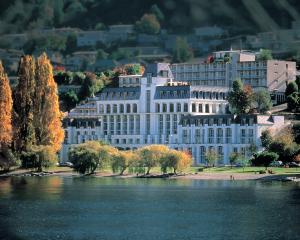However, Air New Zealand spokesman Mark Street said on Saturday he did not see the need to dignify Mr Buchanan's comments with a reply and it made better sense for Jetstar to focus on remedying three days of "significant delays" that had frustrated passengers.
Mr Buchanan on Friday told the Queenstown Chamber of Commerce the Qantas group had a long-established relationship with Air New Zealand, but it had been strained with the launch of Jetstar in New Zealand.
"The aviation game is [about] serving different customers . . . There are opportunities for everyone in the marketplace and [Air New Zealand] has 80% of the market already.
"I'm just surprised at their attitude in terms of they don't want to see a competitor like us come into the marketplace."
Asked to elaborate in a press conference later, Mr Buchanan declined but said: "We're getting under their skin . . . no pun intended on their latest advertising campaign . . . We'll continue to succeed."
Mr Street said Jetstar had cancelled the ground handling services arrangement Qantas had with Air New Zealand and put about 40 jobs at risk.
He said the national carrier had made "significant investments" in Queenstown, including additional transtasman services this winter, a Queenstown-Wellington link last winter and the installation of Required Navigational Performance (RNP) technology on its planes.
Mr Buchanan told members and guests at the chamber's business luncheon at the Skyline Gondola that Qantas and Air New Zealand were more business focused compared with Jetstar's focus on destination and leisure marketing.
He said he was passionate about freeing up the transtasman market.
"Australia and New Zealand represent the largest tourism market for each country and there's a great opportunity for us to change the dynamics of that market. If we can make international air travel between those two countries a little bit simpler and a little bit lower cost, we can jump-drive a huge amount of growth."
Mr Buchanan said about $60 in every airfare across the Tasman was taken by taxes or charges associated with international travel.
"While that's fine when you're travelling to London or the US, where you're spending $1000 or $2000. When you're travelling across the Tasman and it's only a $200 fare, $60 is a big part of that fare."
Mr Buchanan was confident people were going to continue to travel despite the economic downturn, and consumers were looking for more value, he said.
Jetstar was committed to installing RNP technology on its planes by May or June next year, he said.
RNP allows specially trained pilots to fly to lower altitudes, enabling a more precise and efficient route into the airport.
Queenstown Airport is the only New Zealand airport where RNP is used.
Mr Buchanan said the first year of operations would see "some diversions" and he asked for the audience's patience.
However, Mr Street told the Queenstown Times that Air New Zealand's entire fleet of Boeing 737s was equipped with RNP in 2007.
"We'll be getting in and out of Queenstown this winter a lot more often than our competitors, which I'm sure our customers will appreciate."
Mr Buchanan said Jetstar wanted to start night flights once Queenstown Airport finished its runway end safety area project, the runway lights were upgraded and the RNP project was completed.
Mr Buchanan said he saw a clear alignment between the leisure carrier and Queenstown as a leisure destination, which would create "growth and opportunities" for the resort.
The resort would be marketed as a leisure destination across the airline's 50 Asia Pacific ports.
"I think you'll find having a brand like Jetstar, a value-based and leisure-based carrier, in this destination will be quite a refreshing change in the way we market and focus on the destination.
"You've had two full-service carriers that have been serving the destination, and while there's a market for that, I think there's an exciting opportunity for us to really tap in and grow a different market."












